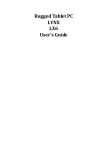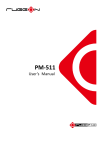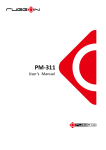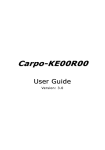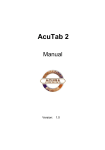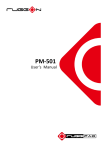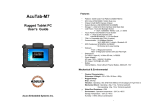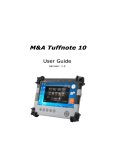Download Ubiqconn T10C User`s guide
Transcript
Rugged Tablet PC T10C User’s Guide T10C User Guide Introduction 1. Please read these safety instructions carefully. 2. Please keep this User’s Manual for later reference. 3. Please disconnect this equipment from connecter before cleaning. Don’t use liquid or prayed detergent for cleaning. User moisture sheet or cloth for cleaning. 4. Make sure the equipments are connected to the power source with the correct voltage, frequency, and ampere. 5. All cautions and warnings on the equipment should be noted. 6. Never pour any liquid into opening: this could cause fire or electrical shock. 7. Never open the equipment. For safety reason, the equipment should only be opened by qualified service personnel. 8. If one of the following situations arises, get the equipment checked by a service personnel: a. Liquid has penetrated into the equipment. b. The equipment has been exposed to moisture. c. The equipment has not worked well or you cannot get it work according to user manual. d. The equipment has dropped and damaged. If the equipment has obvious sign of breakage. 2 T10C User Guide 9. Caution on use of battery: User the battery recommended by the manufacturer or the same type of battery installed by the manufacturer. If incorrect battery is used, it may cause explosion or fire hazard. Recycle or discard used batteries according the manufacturer’s instruction or your local authority. 10. The computers use nonvolatile memory that requires a battery to retain system information when power is removed. The 3V lithium battery is on the system board. The battery life depends on the amount of time the computer is powered on. If the computer does not display the correct time and date, replace the battery. IMPORTANT:Loss of BIOS settings occurs when the battery is removed. BIOS settings must be reconfigured whenever the battery is replaced. WARNING:A risk of fire and chemical burn exists if the battery is not handled properly. Do not disassemble, crush, puncture, or short external contacts, or expose the battery to temperatures higher than 60 °C (140 °F). Do not dispose of a used battery in water or fire. CAUTION:Danger of explosion if battery is incorrectly replaced. 3 T10C User Guide Replace only with same or equivalent type recommended by the manufacturer. Discard used batteries according to the manufacturer’s instructions. FCC Compliance Statement This equipment has been tested and found to comply with the limits for a class B digital device, pursuant to part 15 of the FCC Rules. These limits are designed to provide reasonable protection against harmful interference in a residential installation. This equipment generates uses and can radiate radio frequency energy and, if not installed and used in accordance with the instructions, may cause harmful interference to radio communications. However, there is no guarantee that interference will not occur in a particular installation. If this equipment does cause harmful interference to radio or television reception, which can be determined by turning the equipment off and on, the user is encouraged to try to correct the interference by one or more of the following measures: -- Reorient or relocate the receiving antenna. -- Increase the separation between the equipment and receiver. -- Connect the equipment into an outlet on a circuit different from that to which the receiver is connected. -- Consult the dealer or an experienced radio/TV technician for help. 4 T10C User Guide FCC Caution: Any changes or modifications not expressly approved by the party responsible for compliance could void the user's authority to operate this equipment. FCC RF Radiation Exposure Statement: 1. This Transmitter has been demonstrated co-location compliance requirements with Wi-Fi, Bluetooth and RFID Modules. This transmitter must not be co-located or operating in conjunction with any other antenna or transmitter. 2. This equipment complies with FCC RF radiation exposure limits set forth for an uncontrolled environment. This device was tested for typical hand held operations with the device contacted directly to the human body to the back side of the tablet pc. To maintain compliance with FCC RF exposure compliance requirements, avoid direct contact to the transmitting antenna during transmitting. Europe – EU Declaration of Conformity This device complies with the essential requirements of the R&TTE Directive 1999/5/EC and EMC directive 2004/108/EC. The following test methods have been applied in order to prove presumption of conformity with the essential requirements of the R&TTE Directive 1999/5/EC and EMC directive 2004/108/EC: 5 T10C User Guide EN 55022: 2006 +A1: 2007 EN 61000-3-2 : 2006 EN 61000-3-3 : 1995 + A1 : 2001 + A2 : 2005 EN 55024: 1998 + A1: 2001 + A2: 2003 (IEC 61000-4-2: 2008; IEC 61000-4-3: 2006 + A1:2007; IEC 61000-4-4: 2004; IEC 61000-4-5: 2005; IEC 61000-4-6: 2003 + A1: 2004 +A2: 2006; IEC 61000-4-8: 1993 +A1: 2000; IEC 61000-4-11: 2004) EN 60950-1: 2001 Safety of information technology equipment EN 300 328 V1.7.1: 2006 EN 301 489-17 V2.1.1: 2009 and EN 301 489-1 V1.8.1: 2008 EN 62311: 2008 This device is a 2.4GHz wideband transmission system (transceiver), intended for use in all EU member states and EFTA countries under the following conditions and/or with the following restrictions: In Italy the end-user should apply for a license at the national spectrum authorities in order to obtain authorization to use the device for setting up outdoor radio links and/or for supplying public access to telecommunications and/or 6 T10C User Guide network services. This device may not be used for setting up outdoor radio links in France and in some areas the RF output power may be limited to 10 mW EIRP in the frequency range of 2454 – 2483.5 MHz. For detailed information the end-user should contact the national spectrum authority in France. VCCI statement 7 T10C User Guide Table of Contents Introduction ............................................................ 2 Table of Contents ................................................... 8 Chapter 1 .............................................................. 12 General Information ............................................. 12 1.1. Introduction ........................................................................................12 1.2. Specification .......................................................................................13 1.2.1. Main System ............................................................................................ 13 1.2.2. I/O Interface ............................................................................................. 14 1.2.3. In Front Control ........................................................................................ 14 1.2.4. Power Management ................................................................................. 15 1.2.5. Environment ............................................................................................. 15 1.2.6. Material .................................................................................................... 16 1.2.7. Operation OS ........................................................................................... 16 1.2.8. Certifications ............................................................................................ 16 1.2.9. Optional: Internal Module ......................................................................... 17 8 T10C User Guide 1.2.10. Optional: External Accessories .............................................................. 17 1.3. Packing List ........................................................................................19 Chapter 2 .............................................................. 20 System Setup ....................................................... 20 2.1. Exploring Your T10C ..........................................................................20 2.1.1. The T10C IO ................................................................................... 20 2.2.Preparing for Installation ....................................................................26 2.2.1.Switch ON the main battery ...................................................................... 26 2.2.2.Plugging to the DC supply ........................................................................ 27 2.2.3.Starting Your System ................................................................................ 28 2.2.4.Connecting the keyboard and mouse ....................................................... 29 Chapter 3 .............................................................. 30 Using the T10C ..................................................... 30 3.1.Introduction .........................................................................................30 3.2.Using the USB Ports ...........................................................................30 3.3.Using the External Audio System .....................................................31 3.4.Installing the Battery (optional) .........................................................31 3.5.Using a SIM Card.....................................................................................32 9 T10C User Guide 3.5.1.Inserting a SIM Card ................................................................................. 32 3.5.2.Removing a SIM Card............................................................................... 33 3.6. ................................ Using a Barcode Scanner Module or MSR (optional)33 Chapter 4 .............................................................. 36 The BIOS Setup Program .................................... 36 4.1.Main Screen Setup Utility ...................................................................37 4.2.Advanced BIOS Features ...................................................................39 4.3.Security Chip Configuration ..............................................................40 4.4.Boot Management Setup ....................................................................42 4.5.Exit Control ..........................................................................................43 Chapter 5 .............................................................. 44 User Interface for T10C ....................................... 44 5.1.Introduction .........................................................................................44 5.2.About the User Interface ....................................................................44 5.2.1.Enable or disable the User Interface ......................................................... 44 5.2.3.System Status Information ........................................................................ 45 5.3.Using the Application .........................................................................48 5.3.1.Brightness Control .................................................................................... 48 10 T10C User Guide 5.3.2.Volume Control ......................................................................................... 49 5.3.3.Webcam Launch ....................................................................................... 50 5.3.4.Monitor Switch .......................................................................................... 51 5.3.5.RF Device ON/OFF Control ...................................................................... 52 Chapter 6 .............................................................. 55 Maintenance ......................................................... 55 6.1.Maintaining the Battery ......................................................................55 6.2.Maintaining the LCD Display..............................................................56 6.3.Cleaning the T10C ...............................................................................56 11 T10C User Guide Chapter 1 General Information 1.1. Introduction T10C rugged tablet PC is Intel® Cedar Trail Platform (N2600+NM10) processor core architecture based rugged Tablet PC with a bright 10.4-inch LED backlight LCD display. The powerful CPU brings the most dynamic applications to life without sacrifices to any industrial reliability. Delivering a variety of connectivity features, built-in USBs, Microphone and Headphone port. It is ideal for an all-around system performance. Furthermore, T10C rugged tablet PC is equipped with fanless design. 12 T10C User Guide 1.2. Specification The T10C rugged tablet PC is a flexible, multi-functional flat tablet PC. With following specifications that can be applied in diverse operational environments and implemented in multi-faceted applications. 1.2.1. Main System Platform: Intel® Cedar Trail Platform (N2600+NM10) CPU: Intel ATOM N2600 1.6GHz Dual core Graphic: Intel Graphics Media Accelerator 3600 series Chipset: Intel® NM10 Express Chipset System Memory: 2GB DDRIII 800 SO-DIMM Storage: 1 x 32G SATA Slim Half-Size Solid State Disk LCD Panel: 10.4-inch LED Backlight Screen 10.4“ XGA (1024x768) 340nits LCD + T/P(Polarizer + 1/4 λ+ AR) 10.4“ XGA (1024x768) 500nits (after touch)LCD + T/P(Polarizer + 1/4 λ+ AR) Touch Panel 13 T10C User Guide 5-wire Resistive Touch Screen Audio: -1 x High Quality Speaker (2W) -Internal Microphone : 1 x in front Bezel Communication : - 10/100Mbps Ethernet - Wi-Fi IEEE 802.11 a/b/g/n ; Bluetooth 4.0 Webcam: Front - 2 Mega-pixel Camera Rear - 5 Mega-pixel Camera with LED Flash light 1.2.2. I/O Interface External I/O : 2 x USB 2.0 type A 1 x Audio Jack 1 x Ethernet jack 1 x Docking Connector 1 x DC-Jack LED Status Indicator: Power LED Status: 1 x Green/Red Colors Storage LED Status: 1 x Blue Color Wi-Fi LED Status: 1 x Blue Color 1.2.3. In Front Control Switch : 14 1 x Power Button T10C User Guide 1 x Lock Button 1 x RF Button Button : Program Function Buttons : 6 x Function keys (Programmable) 1.2.4. Power Management Power Adapter : AC to DC, [email protected], 65W AC 100V ~ 240V, 50~60Hz input 19 DC-in Battery (Internal Battery) : Internal Smart Lithium Polymer Battery, 3800mAh (2S1P), 7.4V 1.2.5. Environment Operation Temperature : Storage Temperature : 15 6-ft drop to Plywood (MIL-STD-810G Method 516.6 Procedure IV) Vibration : 5-95% without condensation (MIL-STD-810G Method 507.5) Drop : -20°C to +70°C (MIL-STD-810G Method 501.5 and 502.5) Humidity : -10°C to +50°C (MIL-STD-810G Method 501.5 and 502.5) Operating : SSD (MIL-STD-810G Method 514.6 Category 4 Fig 514.6C-3) Mechanical Shock : T10C User Guide Operating : 20g, 11ms, Terminal sawtooth Non-operating : 40g, 11ms, Terminal sawtooth (MIL-STD810G Method 516.6 Procedure I) Water/Dust Resistance : IP65 equivalent 1.2.6. Material Chassis : Enclosure : PC/ABS Plastic, PC/ABS and TPU Double Injection with Protective Rubber Grips Set Dimension (W x H x D mm) : Semi-Rugged Tablet PC Slate 277.8 x 206 x 26.5mm Weight : Approximate 1.2kg (with internal battery) 1.2.7. Operation OS WIN7 PRO WES7-WS7P 1.2.8. Certifications EMI : FCC part 15 Class B VCCI (V-3/V-4) CE (EN55022 / EN55024) Safety : 16 UL (EN60950), CE T10C User Guide RF : FCC part 15 subpart C SAR : FCC SAR (OET 65 C) 1.2.9. Optional: Internal Module 3.5G Sierra MC8355 Gobi3000 : Protocol : HSUPA/HSDPA/UMTS/EVDO/EDGE Frequency : UMTS/HSUPA/HSDPA 850/900/1800/2100MHz CDMA/EVDO 800/1900MHz GSM/GPRS/EDGS 850/900/1800/1900MHz 1.2.10. Optional: External Accessories MSR : Reference Standards : ANSI/ISO Standards 7810,7811-1/6, 7813 JIS II Decoding Method : Barcode Scanner : Decoded Mode : 17 ISO Track1 - IATA , Track2 - ABA and Track3 – THRIFT 1D Symbologies : EAN/UPC, RSS, Code 39, Code 128, UCC/EAN 128, ISBN, ISBT, Interleaved, Matrix, Industrial and Standard 2 of 5, Codabar, Code 93/93i, Code 11, MSI, Plessey, Telepen, postal codes. T10C User Guide 2D Symbologies: Data Matrix, PDF417, Micro PDF 417, Maxicode, QR, Aztec, EAN.UCC composite. GPS : Channel : 50 channel all-in-view tracking GPS,GLONASS support 1 x Signal Color LED (Blue) Desktop Docking : 4 x USB2.0 type A, 1 x Ethernet, 1 x HDMI, 1 x VGA, 1 x Kensington lock and 1 x DC Jack support External Battery Kits : External Battery Pack : External Battery Charger : Recharges external battery pack Vehicle Application Accessories : 18 Hot-swappable Lithium Polymer battery pack - doubles duration of mobile operation, 4200mAh (2S1P), 7.4V Vehicle Mounting Docking : 4 x USB2.0 type A, 2 x RS232, 1 x 10/100Mbps Ethernet, 1 x VGA and DC-Jack support 75 x 75/100 x 100mm Vesa Mount Holes support 6VDC to 36VDC Input (6VDC to 36VDC for Momentary and 9VDC to 32VDC for Normal) 19 [email protected] Max., total output 30W Cigarette lighter plug power cord ACC power cord (option) T10C User Guide GPS (option) 1.3. Packing List 19 T10C User Guide Chapter 2 System Setup 2.1. Exploring Your T10C Before starting to set up the T10C, get familiar with the locations and purpose of controls, connectors and I/O ports, which are illustrated in the figures below. When placed upright, the front panel of the T10C appears as shown in below. 2.1.1. The T10C IO The T10C I/O is as described below. 20 T10C User Guide F1 Button F1=explorer F2 Button F2=Windows Media Player F3 Button F3=OnScreen keyboard F4 Button F4=Task Manager F5 Button F5=Calculator Fn Button Fn = Hotkey Utility Implement Secure Attention Sequence (SAS) Fn+F3 Button (SAS) Similar function as pressing Ctrl-Alt-Delete on a standard keyboard F1 KEY -LEFT ARROW Function Key mapping during boot F2 KEY -UP ARROW (for Windows system recovery) is as F3 KEY -ENTER follows: F4 KEY -RIGHT ARROW F5 KEY -DOWN ARROW 21 Camera/2 Mega-pixel The built-in camera can be used as a communication device for allowing you to capture images, record videos, and have video chats. It is 2M pixels and transmitting instant image through network for conference. T10C User Guide Digital Microphone The built-in microphone receives sounds and voices when used with the built-in camera. LED Power/Storage/Wi-Fi Keeps you informed of your system’s current power status, Storage access status, and Wi-Fi ON/OFF status. 1. Power Indicator LED 2. Storage Access 3. WiFi ON/OFF 22 Power Indicator LED To let you know that system is turned on and indicate the battery charging status. Lights green when the system is powered on and battery is discharging or when the system is powered on and battery is fully charged Lights blinking red when the system is in S3 Suspend and battery is charging or when the system is in S3 Suspend and battery is fully charged Lights red when the system is powered on and battery is charging. Lights blinking red indicates that the battery is in charging and system is power off / S3 Suspend T10C User Guide Lights off when power off or the battery is fully charged. Storage Access When LED in blue light indicates that the system is accessing the Storage Drive. WiFi ON/OFF When LED turns on, blue light indicates that the WiFi is activated. When LED lights off, it indicates that the WiFi function is disabled. User Interface Button This button is used to define the User Interface function. When you press this button, the system will appear the UI screen as illustrated below for executing the applications easily and quickly. Programmable Function Buttons If your system does not define this button’s function, this button can be programmable to execute specific application. When you program your application, please write this directory as listed below into your configuration file, then the system will aware and execute this application. [Setup] F1_EXE="c:\windows\explorer.exe" F1_PARA="" F1_PATH="" F2_EXE="C:\Program Files\Windows Media Player\wmplayer.exe" F2_PARA="/prefetch: 1" F2_PATH="" F3_EXE="C:\WINDOWS\system32\osk.exe" F3_PARA="" 23 T10C User Guide F3_PATH="" F4_EXE="C:\WINDOWS\system32\taskmgr.exe" F4_PARA="" F4_PATH="" The configuration file is "c:\FKeySet.txt" Camera/5Mega-pixel The built-in camera can be used as a communication device for allowing you to capture images, record videos, and have video chats. It is 5.0 M pixels and transmitting instant image through network for conference. Power Button Switch the computer power on and off, or resumes whenever it is in Suspend mode (by OS define). USB Ports The two USB (type-A) ports allows you to connect USB 2.0-compliant devices (for example, mouse, keyboard and so on) to your Tablet PC. 3.5mm Headphone Jack Allows you to connect an external 3.5mm 4-conductor TRRS (stereo-plus-mic) headphone for personal listening and sound recording. Ethernet Jack The 10/100Mbps Ethernet port allows you to connect to other computers/networks through a local area network (LAN). 24 Accessory Door T10C User Guide By removing the two long screws on top side of the system, allows you to install optional snap-on module. External Battery Connector To install the external battery pack, install external battery holder first and remove the cover of external battery connector before snap the battery pack into the external battery connector. Speaker Integrated stereo speaker for sound and audio output for your multimedia presentations or listening pleasure. Protective Rubber To prevent system harm from vibration or shock, the system is designed with installing protective rubber on four corners. DC-Jack Lets you connect the AC power adapter in supplying continuous power to your Tablet PC and recharging the battery. The AC adapter provides external power source to your system and charges the internal battery pack at the same time. The AC adapter also has an auto-switching design that can connect to any 100VAC ~ 240VAC power outlets. To connect the power adapter: 1. Plug the AC adapter connector to the DC-Jack socket on the right side of the system. 2. Plug the power cord to the AC adapter. Plug the other end of the power cord to a live wall outlet, at the same time, the Power LED at front panel lights up. 25 T10C User Guide -- For the power supply of this equipment, an approved power cord has to be used. -- Make sure the socket and any extension cord(s) you use can support the total current load of all the connected devices. -- Remove all power from the device prior to installing or removing any accessories, hardware, or cables -- Before cleaning the system, make sure it is disconnected from any external power supplies (i.e. AC adapter). Docking Connector Lets you connect the system to docking station to dock the tablet PC when you are at home or office desk. 2.2.Preparing for Installation Your T10C is designed and pre-configured for easy setup and use. This section describes the installation steps you should follow to get the system running as quickly as possible. 2.2.1.Switch ON the main battery a. Main battery switch is located on rear side of battery door b. Adjust DIP switch to “ON” 26 yellow label T10C User Guide c. Place back the battery door 2.2.2.Plugging to the DC supply The AC adapter provides external power source to your system and charges the internal battery pack at the same time. The AC adapter also has an auto-switching design that can connect to any 100VAC ~ 240VAC power outlets. To connect the power adapter: 3. Plug the AC adapter connector to the DC-Jack socket on the left side of the system. 4. Plug the power cord to the AC adapter. 27 T10C User Guide 5. Plug the other end of the power cord to a live wall outlet, at the same time, the Power LED at front panel lights up. -- For the power supply of this equipment, an approved power cord has to be used. -- Make sure the socket and any extension cord(s) you use can support the total current load of all the connected devices. -- Remove all power from the device prior to installing or removing any accessories, hardware, or cables -- Before cleaning the system, make sure it is disconnected from any external power supplies (i.e. AC adapter). 2.2.3.Starting Your System The Power/Resume button is found on the right side of the Tablet PC. Press the Power/Resume button to start your system and check that if the Power LED turns on. After a few seconds, the system’s display will turn on and your system will begin to execute the Power On Self Test or POST to check if all system components are running properly. Any error found during the test will be displayed on the screen. After the test, the screen will also display a message "press <F2> to enter SETUP". You don’t need to run this program at the moment as your dealer already made the necessary settings for your computer 28 T10C User Guide optimal operation. After the test has completed, your computer will start to search and boot up the operating system from your hard drive. 2.2.4.Connecting the keyboard and mouse Before setting up the system, please make sure the following items are available. Keyboard Mouse (for system software installation) A keyboard is an input device; a mouse is a pointing device. Please connect these two devices as graphics shown below to interact with your system. 29 T10C User Guide Chapter 3 Using the T10C 3.1.Introduction This chapter describes the basic features and procedures for using the panel PC. It includes the I/O ports connecting and the touch screen operation. 3.2.Using the USB Ports USB (Universal Serial Bus) is a hardware interface that enables you to connect multiple devices (such as printers, mice, keyboards, storage devices, joysticks, digital cameras, and video conference cameras, etc.) to your tablet pc and up to 127 devices can be attached. Besides, USB’s hot swap capability allows everything to be plugged in and unplugged without turning the system off. USB 2.0 is fully backward compatible, you will be able to use an USB 1.1 device in an USB 2.0 compliant system. 1. Connect the external device to the system. 2. The USB ports support hot plug-in connections. Install the device driver before using the device. 30 T10C User Guide 3.3.Using the External Audio System At the right side of your Tablet PC, you will find the built-in audio ports for connecting Microphone jacks, earphone or powered speaker. To connect to an audio jack: 1. Locate the audio ports (Microphone and Headphone) that you want to use to the target device. 2. Plug the jack into the port on the right side of the system. 3.4.Installing the Battery (optional) T10C provides optional external battery to extend the power of your system. For installing the battery pack, please follow the steps below: 1. Turn off the system. 2. Align the hook wall at the rear side, then place and screw it securely. 3. Remove the cover of the external battery connector (as marked below) and place it on the lower position (as marked below). 31 T10C User Guide 4. Snap the battery pack into the external battery connector and latch into the hook wall securely. For removing the external battery, repeat the above steps in reverse order to remove the battery. 3.5.Using a SIM Card Your T10C can be equipped with a 3.5G module (optional) that can work with SIM card. (SIM card is always working with 3.5G module.) 3.5.1.Inserting a SIM Card To insert a SIM card into the SIM Card slot: 1. Turn off your System. The T10C must be powered off while the SIM Card is being connected. Otherwise, it is harmful to both devices and it shortens the life of these devices. 2. Unscrew the optional accessory cover on top of the Tablet PC. 32 T10C User Guide 3. Make sure the clipped corner facing inward with the metallic label of the card facing down. Push the SIM Card firmly but slowly into the SIM Card slot. To insert a SIM card into the slot, please pay attention only one correct side can be accepted for the card slot. If you cannot insert the card into the slot or you had inserted the card but it is not recognized by the Tablet PC, please remove the card and insert it again. To prevent the damage made both on card and the slot, never forced an entry into the slot with incorrect side. 4. When the full length of the card is almost inside the slot, the SIM Card will be automatically detected. 5. Place the optional accessory cover back to the place and screw it firmly on top of the system. 3.5.2.Removing a SIM Card To remove a SIM Card from the SIM Card slot: 1. Turn off your system. 2. Slightly push the SIM card to pop it out and pull it out directly. When the SIM card has moved out a space out of the slot, hold the edges of the card and slowly slide it out. 3.6. Using a Barcode Scanner Module 33 T10C User Guide or MSR (optional) The T10C System provides barcode scanner and MSR functions for your optional selection, before installing either of these two modules on the top side of the system, please remove the screws previously (illustrated in the following graphics as indicated step 1). To install the Barcode Scanner /MSR Module: 1. Make sure the system is turned off. Unscrew four screws from the accessory door on top of the system. 2. Mount and secure the Barcode/MSR daughter board into the mainboard with screws. 34 T10C User Guide 3. Insert FFC cable of barcode scanner into connector slot or attached the MSR cable to the connectors on the daughter board. 4. Screw to secure the Barcode Scanner/MSR onto the tablet. 35 T10C User Guide Chapter 4 The BIOS Setup Program This system comes with a chip from Phoenix BIOS that contains the ROM Setup information for your system. (This chip serves as an interface between the processor and the rest of the system components.) This section explains the information contained in the Setup program and tells you how to modify the settings according to your system configuration. The Setup utility program allows updates to the main board configuration settings. The BIOS setup values will be saved in the CMOS. It is executed when you change the system configuration, you change the system backup battery, or the system detects a configuration error and asks you to run the Setup program. You must have connected a USB type of keyboard, and Use the arrow keys to select, and press Enter to run the selected program. Function Key Please check the following table for the function description of each direction key. Function Key (s) / / 36 Function Description Moves cursor left or right to select menu on menu bar. Moves cursor up or down to select items T10C User Guide Function Key (s) Function Description + / - To change option for the selected items <Tab> To bring up the selected screen To display the General Help screen To load bios setup defaults value. To save changes and exit the BIOS SETUP UTILITY To jump to the Exit Screen or exit the current screen <F1> <F9> <F10> <ESC> 4.1.Main Screen Setup Utility When you enter the BIOS SETUP UTILITY, the Main screen will appear and display the system overview. 37 T10C User Guide The Standard CMOS Setup screen is displayed above. Each feature may have one or more option settings. Use the arrow keys to highlight the feature you want to change and then use “”or “” to select the value you want for that feature. NOTE: The system BIOS automatically detects EC version, board version, Processor, memory size, thus no changes are necessary. 38 System Date To set the date, highlight the Date field and then press +/- keys to set the current date. Follow the month, day and year format. System Time To set the time, highlight the Time field and then press +/- keys to set the current time. Follow the hour, minute, and second format. BIOS Version The system will automatically displays the information of BIOS version. Build Time The system will automatically displays the build time of BIOS. EC Version The system will automatically displays the information of EC (Embedded Controller) firmware version. VBIOS Version The system will automatically displays the information of VBIOS version of internal graphics. Board Version The system will automatically displays the information of PCB version of mainboard. Processor Type The system will automatically displays the information of Processor Type and speed. T10C User Guide System Memory Speed The system will automatically displays the information of System Memory Speed. L2 Cache RAM The system will automatically displays the information of L2 Cache RAM. Total Memory The system will automatically displays the information of Total Memory. 4.2.Advanced BIOS Features For Advanced Settings, the BIOS will automatically display the Platform information and let you define the configuration when system booting. In this section, you may set the configurations for the following items: Quick boot, UEFI boot, Legacy boot, and Boot Priority. 39 T10C User Guide Select Language Lets you select the language displayed in SETUP UTILITY. (The current BIOS support the languages of English, Japanese and French.) UEFI Boot Lets you activate or close the UEFI boot function by selecting Enabled or Disabled option. Legacy Boot Lets you activate or close the Legacy boot function by selecting Enabled or Disabled option. Boot Priority Lets you set the boot priority from UEFI boot or HDD boot. 4.3.Security Chip Configuration 40 T10C User Guide 41 Supervisor Password is: This option displays the status of Supervisor Password. If the password is entered, it will display “Set” information, or it will display “Cleared” information when there is no password setting. User Password is This option displays the status of User Password. If the password is entered, it will display “Set” information, or it will display “Cleared” information when there is no password setting. Set Supervisor Password This field let you set or clear the Supervisor account’s password. Set User Password This field let you set or clear the User account’s password. TPM Support Lets you activate or close the TPM function by selecting Enabled or Disabled option. (For the non-TPM SKU, this item will display “no detected”.) T10C User Guide 4.4.Boot Management Setup This page allows you to set the search drive sequence where the system will try to boot up first. To select the boot device, you can use the up or down arrow key, then press <+> to move up the device in the list or press <-> to move down the device in the list. To exit from this menu, press <Esc>. 42 T10C User Guide 4.5.Exit Control 43 Exit Saving Changes When you select this option, it will pop-out the following message, “Save configuration changes and exit setup?” Select [OK] to save the changes and exit the BIOS SETUP UTILITY. Exit Discarding Changes When you select this option, it will pop-out the following message, “Discard changes and exit setup?”. Select [OK] to exit the BIOS SETUP UTILITY without saving any changes. Load Setup Defaults When you select this option, it will pop-out the following message, “Load optimal defaults?” Select [OK] to load the default values for all the setup configurations. Save Changes When you select this option, it will pop-out the following message, “Save changes?” Select [OK] to save all changes. T10C User Guide Chapter 5 User Interface for T10C 5.1.Introduction This user interface provides specific mobile utility to let you easily setup some helpful functions and aware the system status directly. This utility also let you adjust some function to fit the requirements, such as brightness and volume adjustment, webcam launch, screen orientation and monitor switching. Furthermore, it also provides system information for your reference, such as battery status, RF setting with its signal strength, firmware (BIOS & EC) version information. Besides these features, you can press the soft button to hibernate this device. 5.2.About the User Interface 5.2.1.Enable or disable the User Interface To display the User Interface, please press the Fn button or point the Hot key Utility on the screen. To close the User Interface function, please press the 44 button on T10C User Guide the top right corner on this User Interface for disabling this utility from the screen. If there is no action took for this utility in 5 seconds, the UI screen will close automatically. 5.2.3.System Status Information This utility shows you the battery capacity status, RF status with its signal strength and system information, and provides the control panel for the function setting. 45 T10C User Guide For battery capacity status: The T10C is equipped with one internal battery and one optional external battery. The battery capacity status shown below advises you, that only one internal battery is embedded with the system which is fully charged, and there is no 2 nd optional battery installed in the system. If the system installs both the 1st internal battery and 2nd optional battery, the illustration shown below indicates its current charging status and capacity. If 1st battery capacity drops to 15%, the system will display the following warning message for 5 seconds. 46 T10C User Guide For RF status: The following RF status shows you that the system is equipped with Wi-Fi, and Bluetooth functions. If you want to close either of these functions, please refer section for how to disable it. The following signal strength shows you that the Wi-Fi function is connecting currently, the stronger the signal strength, the more scale will show on the bar. If there is no module in the system, there will be no status scale in the following status bar. 47 T10C User Guide For System Information : The system information shown on the left shows you the hotkey utility version, BIOS and EC version and you can use them for customer service when asked. 5.3.Using the Application Your T10C has numbers of applications on the control panel for executing specific command. It provides you to adjust brightness, volume, launch webcam, make screen orientation and switch monitor. 5.3.1.Brightness Control For brightness adjustment, press the Brightness 48 command. T10C User Guide When you press it, the brightness control panel is appeared as follows: You can click or to reduce or increase the brightness. Also, you can slide the scale bar to set the brightness. Since the system supports the light sensor, if you tick the brightness Auto adjustment , the screen brightness will automatically adjust according to the operating environment. 5.3.2.Volume Control For Volume adjustment, press the Volume 49 command. T10C User Guide When you press it, the Volume control panel is appeared as follows: You can click or to reduce or increase the audio volume incrementally. Also, you can slide the scale bar to set the audio volume. You can tick the Mute to mute the audio. 5.3.3.Webcam Launch For Webcam Launch, press the Webcam Webcam utility. 50 icon to launch the T10C User Guide 5.3.4.Monitor Switch For Monitor switch, press the Monitor Switch to pop-up the selection bar for choosing the display mode within following four options. You can click Duplicate to display the same contents both on the T10C screen and external display device. The resolution on these two display modes are same, it is not available to adjust the resolution on the external display mode. You can click Extend to display the different contents on the T10C screen and external display device. You only can adjust the resolution on the external display device. 51 You can click Projector only to display on external T10C User Guide projector only. 5.3.5.RF Device ON/OFF Control Press this soft button (via hotkey utility menu) to enable or disable Wi-Fi, Bluetooth, WWAN, or GPS devices. When you press the RF ON/OFF soft button, the screen pops-up the option list for your selection. You can see all functions in this option list have been ticked. To close any device function, please touch the option to close the execution as shown in the following graphics. 52 T10C User Guide Disable Wi-Fi function Disable WWAN function Disable Bluetooth function Disable GPS function To activate the function, please again tick the option as shown in the following graphics to make the device enable. Activate Wi-Fi function 53 Activate Bluetooth function T10C User Guide Activate WWAN function 54 Activate GPS function T10C User Guide Chapter 6 Maintenance Your T10C needs occasional cleaning to prolong their life. Please read this section carefully to ensure proper care of T10C. When it is necessary to clean it, use a soft, lint-free cloth, slightly dampened with a mild detergent solution or use the contents of any commercially available computer cleaning kit. Never use petroleum-based solvents, or harsh detergents to clean the system. Also never spray any liquids directly on the computer case or screen. If the display screen has become smeared or dusty, clean the screen by first applying a mild glass cleaner to a soft, clean, lint-free cloth, and gently wipe the glass. Never apply liquids directly on the screen surface. Moreover, do not use paper towels to clean the display screen. Paper can scratch the display screen matte. 6.1.Maintaining the Battery Do not expose heat or attempt to disassemble the battery, and do not place the battery in water or in a fire. Do not subject the battery to strong impact, such as a blow from a hammer, or stepping on or dropping it. Do not puncture or disassemble the battery. Do not attempt to open or service the battery. Replace only with batteries designed specifically for this product. Keep the battery out of reach of children. 55 T10C User Guide Dispose of used batteries according to local regulations. 6.2.Maintaining the LCD Display Do not scratch the surface of the screen with any hard objects. Do not spray liquid directly on the screen or allow excess liquid to drip down inside the device. Do not place anything, such as food and drink, on the screen at any time to prevent damage to the screen. Clean the LCD display only with a soft cloth dampened with denatured alcohol or a proprietary LCD screen cleaner. 6.3.Cleaning the T10C Turn off the T10C and unplug the power cord. Wipe the screen and exterior with a soft, damp cloth moistened only with water. Do not use liquid or aerosol cleaners on the screen, as these will discolor the finish and damage the screen. 56


























































